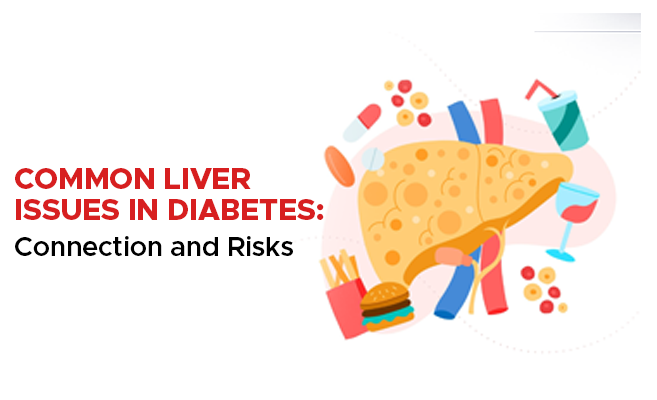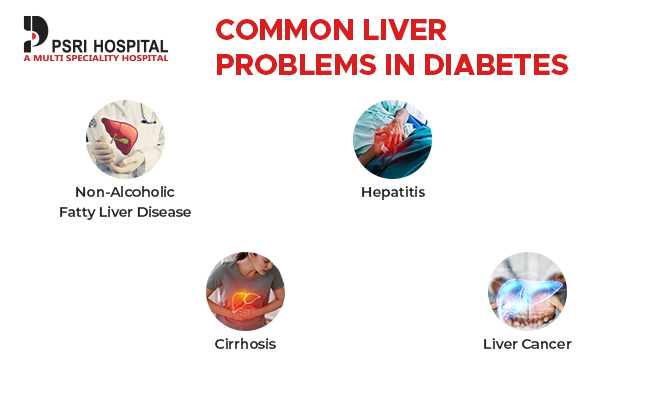Common Liver Issues in Diabetes: Connection and Risks

Diabetes is a condition characterized by high blood sugar levels that affects millions of people worldwide. While most people are aware of the common complications of diabetes, such as heart disease and neuropathy, they usually ignore the connection between diabetes and liver health. The liver plays an important role in regulating blood sugar levels, and when its functioning is compromised, it can worsen the complications of diabetes. Thus, understanding the link between diabetes and liver health is essential for managing both conditions effectively.
The Connection Between Diabetes and Liver Health
Diabetes and liver health are closely interconnected. The liver is responsible for storing and releasing glucose as needed, making it a vital organ in blood sugar regulation. When you have diabetes, especially type 2 diabetes, the excess glucose in your blood can lead to fat accumulation in the liver, causing a condition known as non-alcoholic fatty liver disease (NAFLD). This condition is common among individuals with diabetes and can progress to more severe liver diseases if left untreated.

Common Liver Problems in Diabetes
Individuals with diabetes are at a higher risk of developing several liver-related issues. Here are some common liver problems that may arise if you have diabetes:
Non-Alcoholic Fatty Liver Disease (NAFLD): NAFLD is a condition where excess fat builds up in the liver cells. It is common in people with type 2 diabetes and obesity. If not managed, NAFLD can progress to non-alcoholic steatohepatitis (NASH), which can cause liver inflammation and damage, eventually leading to cirrhosis or liver cancer.
Hepatitis: People with diabetes are an easy target of hepatitis, an inflammation of the liver. This can be due to viral infections like hepatitis B and C or other factors. Chronic hepatitis can severely damage the liver over time.
Cirrhosis: Cirrhosis is the scarring of the liver tissue caused by long-term liver damage. Conditions like NAFLD, NASH, and chronic hepatitis can lead to cirrhosis, which impairs liver function and increases the risk of liver failure.
Liver Cancer: Individuals with diabetes and chronic liver disease have a higher risk of developing liver cancer. This is often a result of long-standing liver inflammation and damage.
Managing Liver Health in Diabetes
Proper management of liver health is important for individuals with diabetes. Here are some strategies to help maintain a healthy liver:
Regular Monitoring: Regular liver function tests can help detect liver issues early. Your doctor may recommend tests like blood tests, imaging studies, or liver biopsies to monitor your liver health.
Healthy Diet: Eating a balanced diet that is low in sugar and saturated fats can help reduce fat accumulation in the liver. Incorporate plenty of fruits, vegetables, whole grains, and lean proteins into your diet.
Weight Management: Maintaining a healthy weight is essential for preventing and managing NAFLD. Even a modest weight loss can significantly improve liver health.
Medication Management: Take your diabetes medications as prescribed and consult your doctor about any potential side effects on your liver. Some medications may need adjustments if liver problems are detected.
Avoid Alcohol: Alcohol can worsen liver damage, so it is important to avoid or limit alcohol consumption if you have diabetes and liver issues.
Symptoms Requiring Immediate Attention
Certain symptoms may indicate severe liver problems and require immediate medical attention. These include:
- Severe abdominal pain or swelling
- Yellowing of the skin and eyes (jaundice)
- Persistent fatigue and weakness
- Dark urine or pale stools
- Unexplained weight loss
The Need for Liver Transplant and Its Cost
A liver transplant becomes necessary when the liver is severely damaged and unable to function properly. Conditions like cirrhosis, liver cancer, and acute liver failure often lead to the need for a transplant. When the liver reaches this critical stage, a transplant is the only viable option to save the patient’s life. The liver transplant cost in India can vary based on the hospital, location, and the complexity of the procedure. This includes pre-transplant evaluations, surgery, and post-operative care. It is important to consider these factors when planning for a liver transplant and to consult with one of the top hospitals for liver transplant in Delhi, like PSRI Hospital, to understand the complete cost and process involved.
Choose PSRI Hospital for the Best Liver Treatments and Care
If you are looking for comprehensive care for diabetes-related liver issues, PSRI Hospital stands out as the best liver transplant hospital in Delhi. PSRI Hospital offers advanced facilities, experienced medical professionals, and personalized care plans to ensure the best outcomes for patients. Whether you need regular monitoring, treatment for liver disease, or a liver transplant, PSRI Hospital provides best quality services to help you manage your health effectively. By taking proactive steps to monitor and maintain your liver health, you can reduce the risk of severe complications and enjoy a healthier life. Trust PSRI Hospital to provide the best care and support for all your liver health needs.
FAQs
What is a root canal treatment?
Ans. A root canal treatment is a dental procedure used to treat an infected or damaged tooth by removing the infected pulp, cleaning the root canals, and sealing them.
Why would I need a root canal treatment?
Ans. You might need a root canal if you have a severely infected or damaged tooth causing pain, swelling, or an abscess.
How can I find the best dentist for a root canal near me?
Ans. Look for a dentist with good qualifications, experience, positive reviews, and modern technology. Recommendations from friends and family can also help.
What are the signs that I might need a liver transplant?
Ans. Signs include severe abdominal pain, jaundice (yellowing of the skin and eyes), persistent fatigue, and dark urine or pale stools.

 Book An Appointment
Book An Appointment Virtual Consultation
Virtual Consultation





